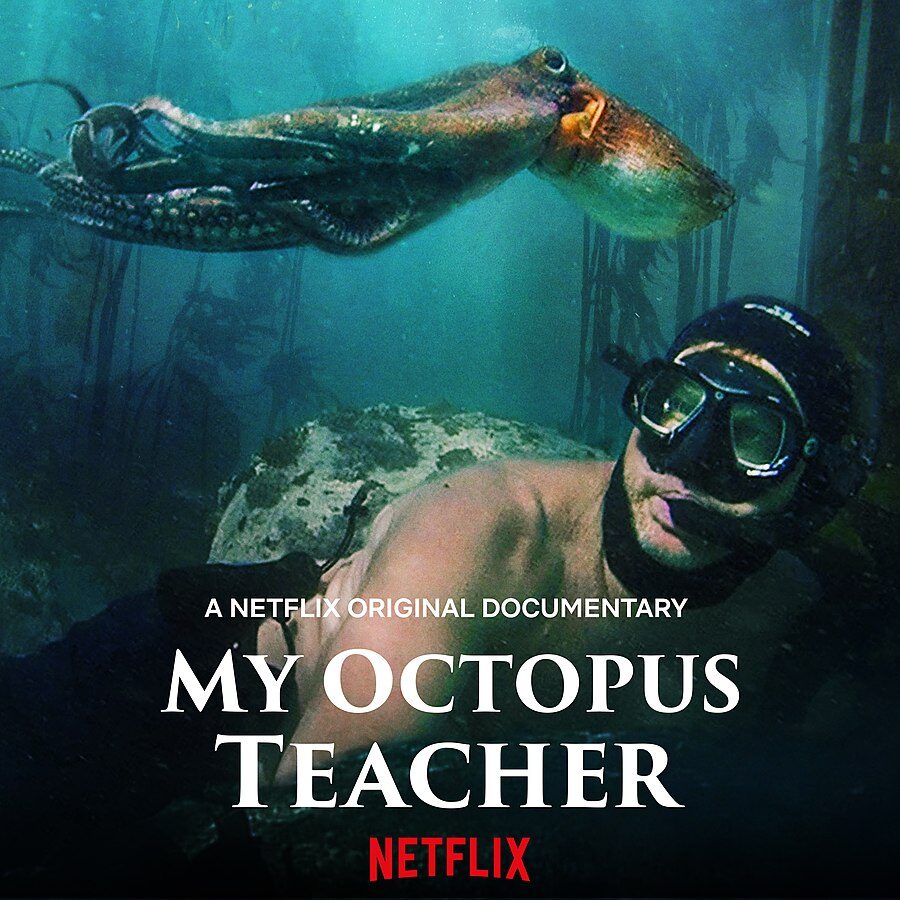The Documentary in the Spotlight: A Review of “My Octopus Teacher”
June 11, 2021
A film for nature lovers and inquisitive Netflix browsers alike leapt into stardom this past year.
“My Octopus Teacher” is a 2020 Netflix Original directed by first-time filmmaker Pippa Ehrlich and James Reed (“Jago: A Life Underwater” and “Animal Impossible”), along with an experienced team including executive producer Ellen Windemuth (“Naledi: A Baby Elephant’s Tale”), executive producer Craig Foster (“The Great Dance: A Hunter’s Story”), consultant editor Jinx Godfrey (“The Theory of Everything” and “Chernobyl”), and Sara Edelson from Netflix. There are three main subjects of this film: naturalist and Emmy-nominated filmmaker Craig Foster, a common female octopus and the kelp forest of South Africa’s False Bay.
On Foster’s dives in the kelp forest off his hometown’s coast, he comes across the elusive octopus hidden in her den. Her mysterious aura fuels his fascination to understand her life by diving into the forest every day for a year, the entirety of the octopus’ life. This unique angle makes the documentary feel like a diary filled with the observations and reflections of Foster, supplemented by intimate underwater footage that brings the kelp forest to life through the eyes of its residents.
Each day’s footage is overlaid with commentary by Foster, which is one main factor that drives the story. However, at times, Foster’s commentary becomes a bit redundant and artificially dramatic, which makes the film stagnate and diverts attention from the marvels of the habitat he is chronicling.
Foster went diving each day without a wetsuit or scuba gear along with a team who helped film most of the movie with no extra gear, a testament to their dedication to preserving the film’s message: in order to become connected to wild spaces, one must be rid of external barriers. The fruits of their labor were the crystalline shots that drove the underwater drama, which filled an octopus’ short life from beginning to end. The videography captured the dynamics between the octopus and her environment, from hunting prey to skillfully outwitting predators. Although Foster doesn’t spend time giving viewers a foundation in an octopus’ intricate biology, a viewer without any background knowledge will come away with emotional revelations about this underestimated mollusk. The lack of any scientific monologues or jargon makes this documentary accessible to anyone mildly interested in the life of an octopus told through the eyes of a narrator who is learning along with the viewer.
While other documentaries provide many points of view by including a wide range of expert opinions, Foster is the sole voice of this film. While this choice narrows the film’s scope, it is also the key element that sets this film apart, for it gives viewers a way to see how a fellow human’s mindset changes through constant exposure to the untamed wild. It provides a tangible lesson in how our viewpoints on our role on this planet can change as well if given the proper education.
This documentary is meaningful for another reason as well: it is part of the work of the Sea Change Project, which was founded by Foster. The purpose of the Sea Change Project is to make the world aware of the beauty and importance of Africa’s marine environment, and to make the Great African Seaforest a revered habitat that connects humanity to their wild origin story.
This premise propelled this film to fame as it accumulated a plethora of awards, including the Academy Award for Best Documentary Feature. It also received a 97% rating from Rotten Tomatoes, an 82% from Metacritic, and an 8.1 out of 10 from IMDb.
“My Octopus Teacher” caters to every viewer, regardless of whether they have watched zero or hundreds of nature documentaries. There is an element of everything in this film, from emotional interludes to action-packed chase scenes. It can even act as a gateway film, opening the viewer’s eyes to the treasure cove of nature documentaries on Netflix, such as the new release “Breaking Boundaries: The Science of Our Planet” featuring David Attenborough, “A Plastic Ocean”, “Cowspiracy”, and “Chasing Coral” to name a few.







